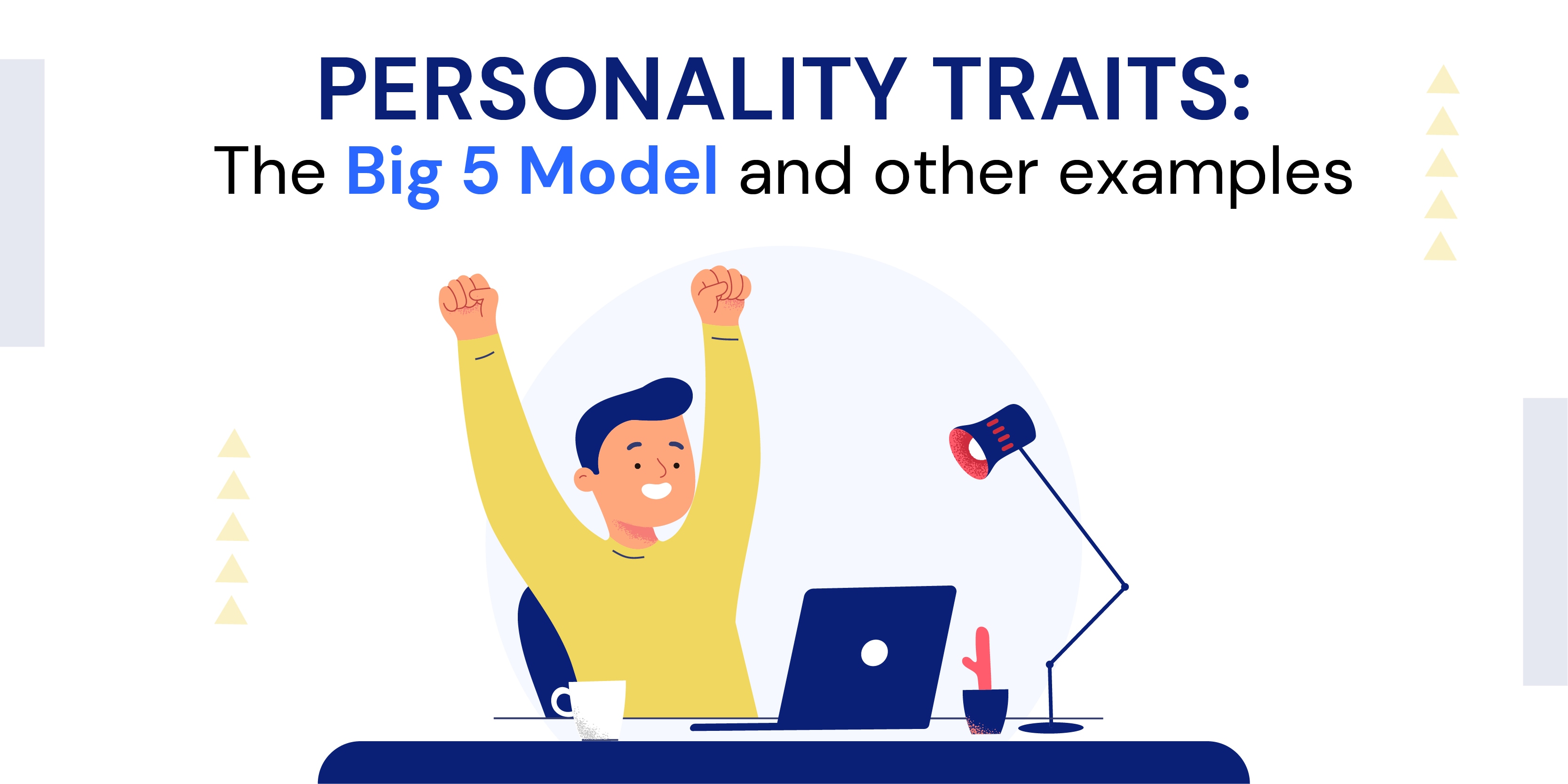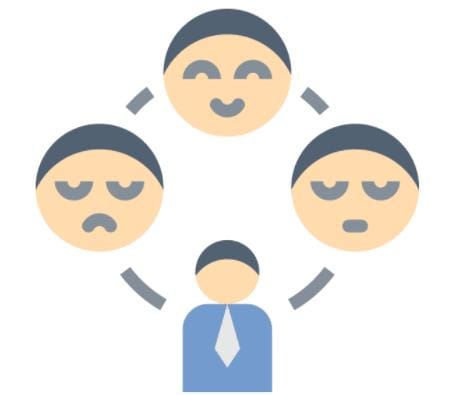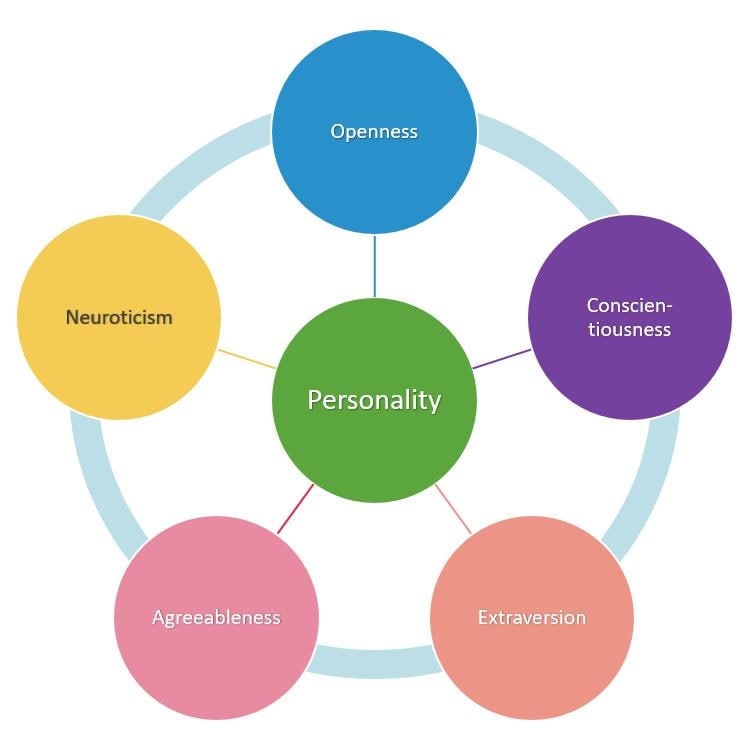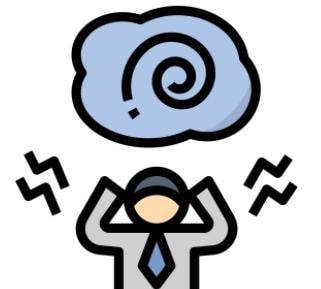
Some people are talkative, while others are quite silent.
Some are physically active, while others are anxious.
Some worry a lot, while others appear to be unconcerned practically all of the time.
These are adjectives that I am using to describe other people:
"talkative," "silent," "active," or "anxious,".
They refer to a person's personality - the distinct ways in which people differ from one another.
Personality can be boiled down into 5 core personality factors, according to popular theories,.
In this article you will learn what are these core personality traits and how you can adapt positive personality traits.
What are Personality Traits?
The Big Five Personality Factors
Examples of Other Personality Traits
What Can I Do to Change My Personality?
How can traits affect your happiness?
How can traits make you more productive?
How Conscientiousness affects your behavior?
What are Personality Traits?

A personality trait is anything about a person that has a long-term impact on how they think, feel, and act. Rather than being discrete occurrences, personality traits are associated with long-term behavioral and emotional patterns.
Anyone can have a terrible day, become upset, and utter a snarky remark from time to time. This isn't indicative of a personality feature when it occurs in isolation.
When a person's usual tendency is to snap at people rather than communicate gently, "snappiness" is most likely a personality feature.
As said by Wayne Dyer:
“If you change the way you look at things, the things you look at change.”
The Big Five Personality Factors
Although there are various ways to think about people's personalities, Gordon Allport and other "personologists" stated that understanding personality traits is the best approach to explain distinctions between people.
According to modern personality psychologists, there are five basic dimensions of personality, which are sometimes referred to as the "Big 5" personality traits. The five broad personality traits outlined by the theory include:
-
Openness
-
Conscientiousness
-
Extraversion
-
Agreeableness
-
Neuroticism

When trying to remember the big five traits, you might find it beneficial to employ the acronym OCEAN (openness, conscientiousness, extraversion, agreeableness, and neuroticism).
It's worth noting that each of the five personality traits comprises a spectrum spanning two extremes. Most people in the actual world fall halfway between the two extreme ends of each dimension.
The following are typical descriptions of these five character traits:
1. Openness
Characteristics like inventiveness and insight are present in this trait.
People that score well on this attribute also have a diverse set of interests. They are curious about the world and other people, and they are ready to learn new things and participate in new activities.
People with a high level of this personality trait are more daring and inventive. People that score low on this feature tend to be more traditional and may have difficulty thinking abstractly.
People with High Level Openness |
People with Low Level Openness |
| Very inventive | Not very creative |
| Willing to try new things | Doesn't like trying new things |
| Dedicated to taking on new challenges | Do not like change |
| Happy to ponder abstract ideas | Dislikes abstract or theoretical concepts |
2. Conscientiousness
High degrees of thinking, good impulse control, and goal-directed behaviors are all common characteristics of this dimension.
Highly conscientious people are usually well-organized and detail-oriented. They think ahead, consider how their actions influence others and keep track of deadlines.
People with High Level Conscientiousness |
People with Low Level Conscientiousness |
| Prepare ahead of time | Makes a mess and doesn’t takes responsibility for it |
| Completes vital duties quickly | Failure to complete required tasks |
| Pays close attention to the details | Procrastinates important activities |
| I Appreciate having a timetable | Dislikes routine |
3. Extraversion
Excitability, friendliness, talkativeness, assertiveness, and high levels of emotional expressiveness are all characteristics of extraversion (or extroversion).

People with a high level of extraversion are gregarious and thrive in social circumstances. They become invigorated and delighted when they are in the company of others.
People with low extraversion (or introversion) are more restrained in social situations and have less energy to exert.
People with High Level Conscientiousness |
People with Low Level Conscientiousness |
| Takes pleasure in being the focus of attention. | Prefers to be alone |
| Enjoys meeting new individuals and starting conversations | Dislikes small talk |
| Has a large social circle of acquaintances and friends | Dislikes being the focal point of attention |
| Makes new friends easily | Finds it difficult to strike up a conversation |
| Feels energized when surrounded by people | Feels drained when having to interact socially |
4. Agreeableness
Trust, altruism, kindness, affection, and other prosocial behaviors are examples of traits found in this personality dimension.

People with a high level of agreeableness tend to be more cooperative, whereas those with a low level of agreeableness tend to be more competitive and, at times, deceptive.
People with High Level Agreeableness |
People with Low Level Agreeableness |
| Has a strong interest in other people | Prefers to be alone |
| Concerned about others | Dislikes small talk |
| Empathizes with and cares about other people | Dislikes being the focal point of attention |
| Enjoys assisting and contributing to the happiness of others | Finds it difficult to strike up a conversation |
| Assists others who are in need | Feels drained when having to interact socially |
5. Neuroticism
Sadness, moodiness, and emotional instability are all characteristics of neuroticism. Mood fluctuations, anxiety, impatience, and sorrow are common in those who score high on this attribute. Those who score low on this attribute are more emotionally stable and resilient.

People with High Level Conscientiousness |
People with Low Level Conscientiousness |
| Goes through a lot of stress. | Emotional stability |
| Concerns about a variety of issues | |
| Easily irritated | Has a good stress management strategy |
| Has significant mood swings | |
| Has an apprehensive feeling | Rarely stresses or worries |
| Struggles to recover from traumatic incidents |
Examples of Other Personality Traits
People have distinct personalities that define them. There are numerous types of personality qualities, some of which are positive and others which are negative.
You'll find what you're searching for here, whether you're seeking personality qualities for characters in novels you're writing or just the proper words to express aspects of your or someone else's personality.
Positive Personality Traits
Positive character traits can appear in a variety of ways. When a person's regular conduct demonstrates the same positive characteristics repeatedly, the linked actions become indicative of their personality.
The bold adjectives in the instances below are descriptive words that are widely used to indicate the positive feature mentioned.
List of Positive Personality Traits |
|
| 1 | Truthful |
| 2 | Accepting Responsibility |
| 3 | Adaptability |
| 4 | Affability |
| 5 | Kindness |
| 6 | Understanding |
| 7 | Empathy |
| 8 | Courage |
| 9 | Confidence |
| 10 | Loyalty |
| 11 | Trustworthy |
| 12 | Adventurous |
| 13 | Brave |
-
Being truthful and accepting responsibility for your actions are excellent characteristics
-
Adaptability and affability are valuable qualities for getting along with others
-
Drive, tenacity, and perseverance can help a person persevere in the face of adversity
-
Kindness, understanding, and empathy all aid in a person's ability to connect with others
-
Patience is a personality quality that is universally admired in addition to being a virtue
-
In difficult situations, courage and confidence can aid a person's decision to do the right thing
-
Loyalty is a desirable attribute to have because it helps others determine whether or not you are trustworthy
-
You can be more willing to accept risks if you are adventurous and brave
Negative Personality Traits
What would life be like if there was no balance? People aren't all good or all bad, for the most part (though there may be some exceptions). There's a good chance that you, like everyone else you meet, have a few negative personality traits.
List of Negative Personality Traits |
|
| 1 | Tendency to lie |
| 2 | Dishonest |
| 3 | Carelessness |
| 4 | Inability to sympathize with others |
| 5 | Prone to rage |
| 6 | Unfriendly |
| 7 | Sullen or surly by nature |
| 8 | Finicky |
Consider the following examples of negative characteristics. The descriptive words or phrases that are widely employed to represent these characteristics are bold once again.
-
A tendency to lie to escape taking responsibility for one's actions is a disgraceful trait
-
It's also a negative trait to tend to be untruthful or dishonest in your relationships with people
-
Others will be turned off by your carelessness and excuses for not meeting duties
-
A negative personality feature that can alienate others is the inability to sympathize with others
-
Being prone to rage will sabotage relationships and alienate others
-
Unfriendly individuals are frequently perceived as impolite and/or uninterested in interacting with others
-
In a personal or professional setting, those who are sullen or surly by nature can be harsh and unpleasant to deal with
-
Finicky or fussy people come across as excessive perfectionists who can't be satisfied no matter what they do
What Can I Do to Change My Personality?
What makes up your personality?
Answer is:
The activities you take.
And the decisions you make.
It's most likely the result of both nature and nurture.
You are either a patient person or not.
You are either a responsible person or not.
You have little control over which personality traits or natural tendencies are at work in your thoughts.
But,
You can influence how these traits influence your behavior hence your personality.
By acting upon following activities you can change your personality:
Meet new people:
If sociability is a personality trait that you struggle with, forcing yourself to meet new people at a social gathering can help you become more sociable.
Develop a pastime:
Developing a pastime is a great method to become a well-rounded person who is willing to try new things.
Play Sports:
Sports may teach you collaboration, humility, and respect for other people's contributions
Practice a variety of arts and crafts
Practicing a variety of arts and crafts can help you become more patient while also pushing the boundaries of your imagination.
Volunteer for a charity organization
Volunteering for a charity organization to aid individuals who are less fortunate than you can help you become more loving and less selfish.
Read books
Reading a book can broaden your views and motivate you to improve by introducing you to new ways of thinking and doing.
Negativity, as well as being cheerful and upbeat, can have an impact on others around you.
Offering a nice grin to a stranger, can improve their day, whilst gazing at them directly or indirectly can lower their mood.
As quoted by Elisabeth Kubler-Ross:
“People are like stained-glass windows. They sparkle and shine when the sun is out, but when the darkness sets in, their true beauty is revealed only if there is a light from within.”
Lastly, understanding personality qualities is an excellent place to begin your quest for self-awareness. It's up to you to adapt away from bad inclinations and instead exhibit positive features if you truly want to understand how to avoid being defined by negative personality traits.
The more you shift your focus away from the negative and toward the good, the easier it will be to present yourself in a favourable light.
Organise your Files
Decluttering your files on your computer is another great way to organise your life. Files are playing an increasingly important role in our daily lives, from assignments to spreadsheets, they play a vital role from education to work.
People can use Wondershare PDFelement Cloud to neatly organise your files on a cloud. This way you can easily access all your documents from a single space, whether it's your desktop, tablet or handheld mobile phone.

How can traits affect your happiness?
Do you know your happiness makes you live longer?
So,are you happy?
If no, then you can build these traits over time to become more happier
1. Enthusiasm
Enthusiastic love to express and laugh. They are full of positive emotions and have high goals in life. Such people are strong in relationships and highly satisfied with life.
2. Low withdrawal
I think every human wants to be low in neuroticism so that they can experience less anxiety. People of low withdrawal handle everything more gracefully and are emotionally stable.
3. Industriousness
People who work hard and have high achievements are not scanty! They are the ones who are engaged in their life and enjoy the feeling of mastery.
4. Compassion
Do you feel happiness in helping others?
Carry on! Indeed a great work you are doing.
People who care about others' well-being, happiness increase their own. Your time investment is worth millions.
5. Intellectual curiosity
Those who love to solve complex problems, always welcome new ideas. They think deeply, make a good reflection and help themselves to grow.
Personality traits need to be considered too!
What do you say?
How can traits make you more productive?
Conscientiousness is a great trait that if you build over time can make you a far more productive person from your current state.
What is conscientiousness?
It is a desire to perform your task well, to take your commitments seriously.
One could say that trait is all about being diligent and careful.
But, is it all about being careful?
I guess it is not!
It is also about efficiency.
When people are being conscientious, they set high aims and are more efficient in achieving their goals.
They also become more systematic, enabling them to be more attentive and hardworking.
Why is conscientiousness important?
People having conscientiousness traits; always consider the consequences of the steps they are taking. They are critical thinkers and have great problem-solving skills.
It is a valuable trait to have because this is something that many employers look for in a candidate.
Paul J. Meyer further dives deeper into the meaning of conscientiousness:-
“Productivity is never an accident. It is always the result of a commitment to excellence, intelligent planning, and focused effort.”
From this quote, we learn that commitment, planning, and focused effort lead to being a productive person. These qualities sum up conscientiousness very well!
Let's explore the sub traits of conscientiousness!
Sub traits of conscientiousness
There are a total of six sub traits.
1. Achievement-Oriented
People who are always striving for excellence in the things they perform are high in conscientiousness and are high achievers. They are ambitious and tend to have high goals.
2. Cautious
Considering all the facts before making decisions and choosing options wisely is to be cautious. Such people take their time and deal with the best.
3. Dutiful
A well-rounded person with a strong sense of moral obligation and duty has a high score in conscientiousness.
Are you a promise keeper?
Always follow up on your commitments?
These people are faithful and devoted people as well.
4. Orderly
Someone who is highly organized; reward themselves with routines and proper schedules. They are punctual and like list-making.Thus, orderly.
5. Self-disciplined
High scores in conscientiousness also lead to self-discipline. Such people tend to be more persistent when things get difficult. They are more focused and always complete tasks even when things get complicated.
Like W. K Hope said
"Self-discipline is when your conscience tells you to do something and you don't talk back. "
6. Prone to self-efficacy
A person who scores high in conscientiousness is more likely to complete their goal and be successful. Their ability to see things differently helps them to see things till the end until they are not completed.
Having this trait can change you as a person. Let’s explore.
How Conscientiousness affects your behavior?
Conscientious people don't waste their time in fun and doing extra activities, their main aim is to achieve their goals.
Such people are more responsible, organized, goal-oriented, hard-working, and reliable.
Such people are more organized. They are productive and are dependable. They are the planners and always work on schedules.
Taking notes, keeping promises, and showing up on time is their nature. They show their self-care through yoga, exercise, a healthy diet, and proper sleep. Such people do not smoke cigarettes and are less likely to use drugs.
Final words
I hope that reading about all these traits have made you understand yourself better and build on those traits that you need the most.



